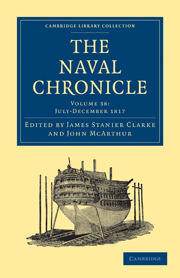 The Naval Chronicle
The Naval Chronicle Book contents
- Frontmatter
- PLATES IN VOLUME XXXVIII: From Original Designs
- PREFACE TO THE THIRTY-EIGHTH VOLUME
- BIOGRAPHICAL MEMOIR OF CAPTAIN WILLIAM LAYMAN, OF THE ROYAL NAVY
- BIOGRAPHICAL MEMOIR OF CAPTAIN WILLIAM LAYMAN, OF THE ROYAL NAVY
- BIOGRAPHICAL MEMOIR OF ROBERT HENDERSON, ESQ. CAPTAIN IN THE ROYAL NAVY
- BIOGRAPHICAL MEMOIR OF THE LATE CHARLES BOYLES, ESQ. VICE-ADMIRAL OF THE BLUE
- BIOGRAPHICAL MEMOIR OF THE LATE WILLIAM FOTHERGILL, ESQ. CAPTAIN IN THE ROYAL NAVY
- BIOGRAPHICAL MEMOIR OF KENNETH MACKENZIE, ESQ. CAPTAIN IN THE ROYAL NAVY
- INDEX
BIOGRAPHICAL MEMOIR OF CAPTAIN WILLIAM LAYMAN, OF THE ROYAL NAVY
Published online by Cambridge University Press: 10 January 2011
- Frontmatter
- PLATES IN VOLUME XXXVIII: From Original Designs
- PREFACE TO THE THIRTY-EIGHTH VOLUME
- BIOGRAPHICAL MEMOIR OF CAPTAIN WILLIAM LAYMAN, OF THE ROYAL NAVY
- BIOGRAPHICAL MEMOIR OF CAPTAIN WILLIAM LAYMAN, OF THE ROYAL NAVY
- BIOGRAPHICAL MEMOIR OF ROBERT HENDERSON, ESQ. CAPTAIN IN THE ROYAL NAVY
- BIOGRAPHICAL MEMOIR OF THE LATE CHARLES BOYLES, ESQ. VICE-ADMIRAL OF THE BLUE
- BIOGRAPHICAL MEMOIR OF THE LATE WILLIAM FOTHERGILL, ESQ. CAPTAIN IN THE ROYAL NAVY
- BIOGRAPHICAL MEMOIR OF KENNETH MACKENZIE, ESQ. CAPTAIN IN THE ROYAL NAVY
- INDEX
Summary
CAPTAIN LAYMAN's attention and research having been engaged both at home and abroad to the means of supporting the material of the navy, ever since the elaborate Report of the Commissioners of Woods and Forests, &c. printed by order of Parliament, in 1792, stating—“That such is the present state of the growing timber, and the prospect of future supply, that this country will in all probability experience a fatal want of great oak timber, and become dependent on other powers for the means of supporting her navy, if care be not taken to provide a supply in future, and to reduce the consumption of it, by the utmost care and frugality in the expenditure.” In 1797, when the scarcity attracted the attention of the best informed men, Captain Layman presented to his Majesty's ministers his observations, in a memoir on the subject of supply; and in 1799, when the well-grounded apprehension of a want of good naval timber began to be realized, he was desired to state more particularly the superiority of Malabar teak to any other ship timber. In the following year, when the inferior quality of foreign timber used in our ships of war foretold speedy decay, Captain Layman endeavoured to show the impolicy and weakness of such dependence on other nations, when we had the power to obtain in our Eastern Provinces the best ship timber in the world; and as our ships of war were then getting very defective, and as supply was absolutely necessary, he submitted a Plan to Earl St. Vincent, in 1800, for building ships of war of Malabar Teak, to commence by constructing not only a frigate, but a line of-battle ship, of 2000 tons; at Bombay; Captain Layman having gone upwards of 500 miles in one instance to ascertain the means.
- Type
- Chapter
- Information
- The Naval ChronicleContaining a General and Biographical History of the Royal Navy of the United Kingdom with a Variety of Original Papers on Nautical Subjects, pp. 89 - 176Publisher: Cambridge University PressPrint publication year: 2010First published in: 1817
